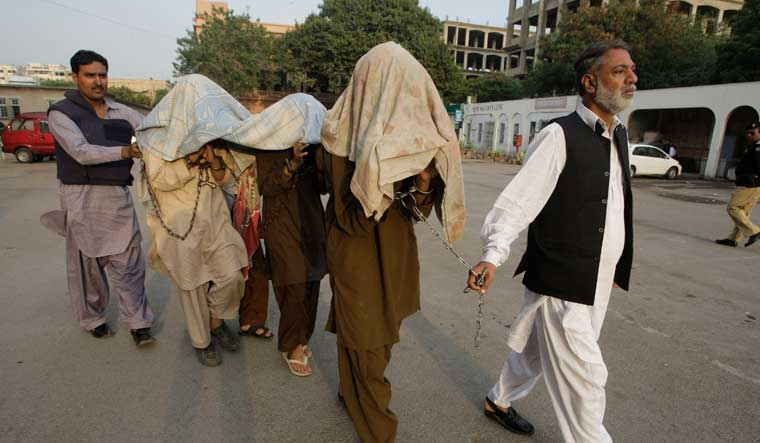Two days after the disastrous Pakistan mosque blast which claimed over 100 lives in Pakistan, the embattled nation's defence minister Khawaja Asif made a passionate speech in the parliament. He said: "Soul searching and self accountability has become imperative due to our own follies and blunders as the seeds of terrorism were sown during the dictatorial tenures."
His words unwittingly attested to India's argument that Pakistan was nurturing terrorism in its backyard. Only this time, it has come back to bite it. Through the bloody suicide attack in the city of Peshawar, once known for its flowers and olives, Pakistan was reminded that the Tehreek-e-Taliban Pakistan (TTP) or the Pakistan Taliban as they are known, will continue to terrorise the country.
The TTP, an umbrella organization of various Islamist armed militant groups operating along the Afghan–Pakistani border, denied responsibility for the Monday's blast, despite claiming it first. Later a TTP splinter group Jamaat-ul-Ahrar claimed to be behind it.
The post-blast discussions saw the Pakistan government and lawmakers blame former Prime Minister Imran Khan and his Pakistan Tehreek-e-Insaf (PTI) for the rise in terror.
Khawaja Asif said: "This war started from Swat during the PPP’s tenure and it was concluded during the PML-N’s previous tenure, and peace was established in the country from Karachi to Swat.
But if you remember, a year-and-a-half or two years ago […] we were given a briefing two, three times in this same hall in which it was clearly stated that talks could be carried out against these people and they can be brought toward peace."
For the uninitiated, TTP was founded in 2007 with the main motive of stricter enforcement of Islamic sharia law. The group has been responsible for some of the deadliest terrorist attacks, including the 2014 Peshawar Army School attack, which claimed the lives of 132 children.
However, the group waned in power after military operations in 2014 and 2017, which resulted in heavy bloodshed. The TTP sprung back to power after the US sudden withdrawal from Afghanistan.
It was then that Imran Khan-led government made the now-controversial decision to strike a peace deal with the deadly organisation. Despite popular opinion that such peace deals won't really serve the country's national interest, Khan went ahead with the move, offering TTP a number of rewards – from political amnesty to prisoner releases – in return for laying down arms.
As part of the deal, over 100 TTP activists, including murderers, were released from prison. Khan even said the government was considering offering amnesty to TTP fighters so that they become "normal citizens." In the process, he brought back over 5,000 TTP fighters to Pakistan from Afghanistan. Both parties agreed to a ceasefire.
Without enough funds to rehabilitate the hardcore criminals, the programme eventually failed, and the TTP militants were roaming on the home soil undettered carrying out ransom kidnapping and extortion of local businesses.
The TTP called off the ceasefire last year and ordered its militants to stage attacks across the country. "As military operations are ongoing against mujahideen in different areas [...] so it is imperative for you to carry out attacks wherever you can in the entire country," the statement said.
And, the brunt is borne by the current government. "Decisions made some two years ago had not been endorsed by this house. We were only told in the briefings that this decision had already been made. Now, who will be held accountable for the bloodshed?" Asif said.
The TTP threat will not disappear that easily. According to Riccardo Valle, a Venice-based researcher with The Khorasan Diary – a non-partisan platform run by journalists, it is evident that armed organisations thrive on the lack of socioeconomic opportunities and take advantage in its absence. "It is safe to assume that Khyber Pakhtunkhwa, including tribal districts, have been neglected for years by the central government, whereas at the same time, its people have suffered the brunt of the war against terrorism and the backlash of the insurgency in Afghanistan," he told Al Jazeera.
He noted that the TTP has now changed the tone and were highlighting the basic needs of people such as water, gas and electricity. "With the deteriorating economic situation in the country, the TTP increases its chance of capitalising on these grievances," he told Al Jazeera.



